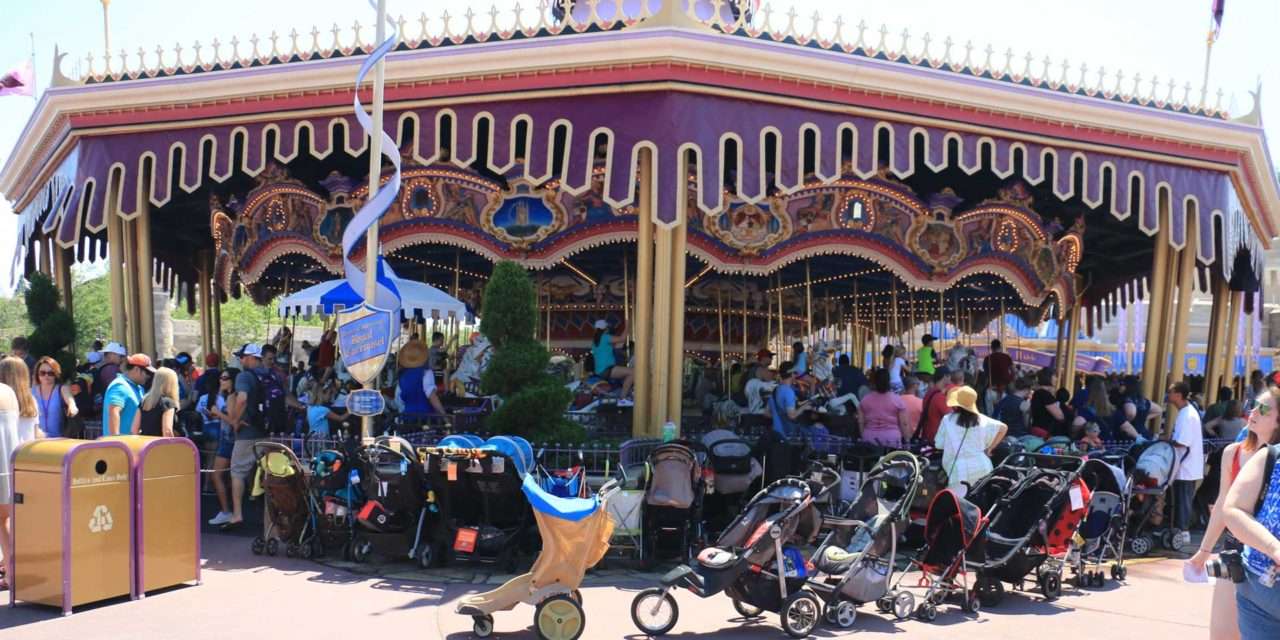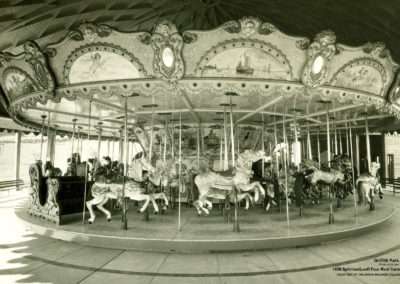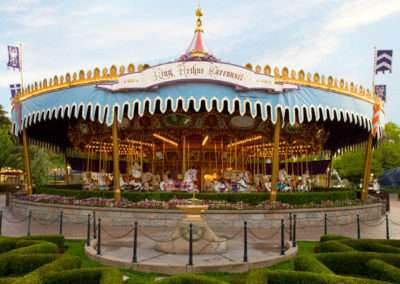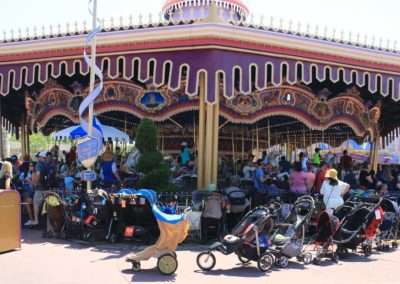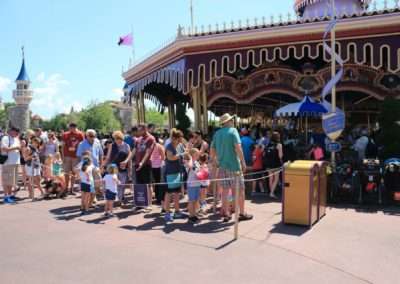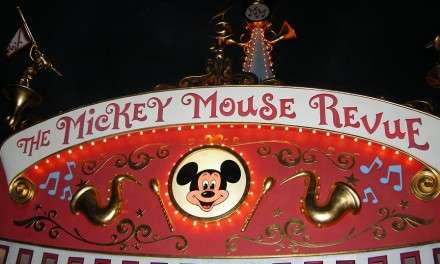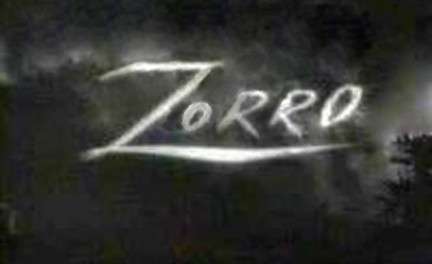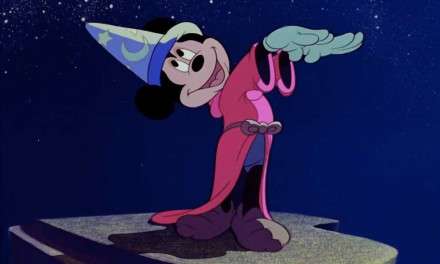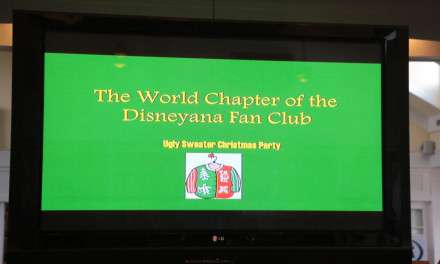I have been a Disney traditionalist my whole life. I love the classic Disney cartoon shorts and feature animations. I know that Walt loved progress and technology, and was frustrated many times because his ideas were beyond the tech science of the day. But as advanced as CG gets, which allows animated toons and movies to jump from the screen, almost as real-live characters, nothing can replace the simple, yet elegant cartoons of the early era. Rubber hose technique, antiquated and dated by today’s standards, makes a Mickey Mouse short what it should be, classic.
The same goes for the attractions at the parks. Everyone wants to ride Soarin’ or Space Mountain, Expedition Everest and the like, but seem to side-step the simple, yet classic attractions. I love Mr. Toads’ Wild Ride, the Teacups, Dumbo and one of the World’s oldest attractions so to speak, Cinderella’s Golden Carousel, or as its known today as Prince Charming’s Regal Carrousel. The Carousel we know today as a fun and classic family ride got its start in a quite different way. But it is interesting to note, that this attraction is what sparked Walt Disney’s mind into the creation of Disneyland, a place for parents and kids to have fun together!
The age of this “Ride Attraction” goes back to the time of the Knights of Europe and the Middle East. One of their training exercises was galloping in circles, tossing balls to one another, which required much skill. This evolved into spearing small hanging rings from trees with their lances. Finally, someone devised a round revolving platform with wooden horses the Knights would ride, saving the wear and tear on the horses, and time much like flight simulators today, and they would try to spear the rings riding on this marvelous contraption. That is where grabbing the golden ring on modern Carousels came from. Many people marveled at this “Game” and the game began to be played by commoners, and soon these Carousels (The word carousel arose from the Italian garosello and Spanish carosella, meaning “little battle”) soon appeared at fairgrounds across Europe. At the Place du Carrousel in Paris, an early carousel was set up with wooden horses for the children.
These modern-day Carousels, or Merry-go-Rounds turn anti-clockwise in the United States and Mainland Europe and Clockwise in the United Kingdom. It was during the Great Depression, that caused the drop in attendance at amusement parks, which caused many carousels being abandoned or destroyed as fewer and fewer companies producing them went out of business. Carousels were now deemed a children’s ride, not an adult. Somewhat more than 100 carousels built before the Great Depression still exist intact today. At one time, there were more than 4,000 operating carousels.
In an interview with Walt Disney in 1963 with actor-announcer and director Fletcher Markle, he asked Walt… “Where did you originally get the first notion for Disneyland?” Walt responded… “Well, it came about when my daughters were very young and Saturday was always Daddy’s day with the two daughters. So, we’d start out and try to go someplace, you know, different things. I’d take them to the merry-go-round and I took them different places and I’d sit while they rode the merry-go-round. Sit on a bench, you know, eating peanuts. I felt that there should be something built where the parents and the children could have fun together. So, that’s how Disneyland started.”
The Merry-go-Round that Walt was referring to in Griffith Park is still in operation there. It was built in 1926 by the Spillman Engineering Co. Located between Los Feliz park entrance and the Los Angeles Zoo, it has been entertaining guests for more than five generations. It is in the most case original, and is the only Spillman Merry-go-Round in existence. It boasts a Stinson 165 Military Band Organ, reputed to be the largest band organ playing music on a carousel on the West Coast. It plays more than 1,500 selections of waltz and marching music. The Carousel boasts 68 ornately hand-carved horses and each one is a jumper. All four rows of horse’s feature jewel-encrusted bridles, have detailed draped blankets and decorated with sunflowers and lion’s heads. Also, there are two chariots depicting Adam chasing Eve and one of them features a tablet stating… “Restored in memory of Walt Disney through the generosity of the Walt Disney Family Foundation.”
It was acquired before the Depression by the sugar magnate John D. Spreckels. After the pier fell victim to the Depression, the Merry-go-Round was moved to Balboas Park for the 1935–36 California Pacific International Exposition. After the Exposition, Ross R. Davis, a carousel broker, purchased the carousel and placed it in Griffith Park in 1937, where it has been in continuing operation since. In 1984 the Carousel was purchased by Rosemary West and Warren Deasy and they began the slow task of restoration using profits from the carousel to pay for its restoration. The effects of time and weather have made restoration necessary on this historic attraction. In Disneyland, along the wall in the front entrance of the Main Street Opera House, there is a bench with a placard on it that says… “The actual park bench from the Griffith Park Merry-Go-Round in Los Angeles, where Walt Disney first dreamed of Disneyland.”
Disney’s Cinderella’s Golden Carrousel (Notice the spelling with 2 r’s, which is to reference the French word for the original and it was the French version of the Cinderella story that Disney adopted for the animated feature) was constructed by the Philadelphia Toboggan Company in 1917. At the time, it was one of the most prestigious Carousel companies in the nation. The horses were carved by German and Italian craftsmen to express the patriotism that was prevalent in the United States after the First World War. The carousel was named Liberty, was festooned in colors of Red, White and Blue; and being 60 feet in diameter, was one of the largest Merry-go-Rounds ever built. Its first home was in Belle Isle Park in Detroit, Michigan. Liberty had 72 wooden horses, two chariots and seated 99 passengers, five abreast. The horses were gray, white, black and brown, aping the horses of the American frontier. In addition, there were eighteen paintings of western scenery, and carved characters of Lady Liberty, each holding shields featuring a flag emblem of red, white and blue was on the interior top circle.
In 1928, it was re-furbished in Philadelphia and transported to Olympic Park in Maplewood, N.J. where it entertained guests for the next 39 years. Note the Toboggan Company built only 89 Carousels during its run. The Liberty is number 46. Only a dozen of these remnants from a bygone era are operating today. Olympic Park closed in 1965. The Carousel was so damaged, it was going to be demolished. At the time, history buffs were scouring the country for antique carousel horses, and it was intended to sell these treasures to buyers. But Disney Imagineers, looking for a carousel for the planned Magic Kingdom in Florida, found and purchased the Liberty in 1967.
For more than 20 years, Imagineer John Hench and a very talented park employee and craftswomen named Isle Voght were tasked with supervising and maintaining the carousel. When the carousel arrived, there was much work to be done. Disney artisans were astounded by the details of the maple horses after the years of paint layers and grime were removed. The paint was scraped down only to the primer because a loss of detail could happen. All the horses are painted white. White was chosen because the color references to the color of the horses that pulled Cinderella’s coach. And second, most people considered a white horse a “Hero” horse. No two horses are alike. Today there are 90 horses and one chariot, and the row of horses are five deep. The additional horses were purchased from two other well-known manufacturers of carousels; the Dentzel Co. and Parker Co. The difference between a Merry-go-Round and a Carousel is all the horses on a Carousel move up and down. The largest horses are on the outside, smallest on the inside. All the horses have a number, which is embellished on their bridles. There are also 2, 325 lights on the carousel.
There were originally two chariots on the Liberty. When the Carousel was being readied for Walt Disney World, the two original chariots were removed so more horses could be installed. These Chariots soon disappeared, and could not be located by Voght or Hench. It was decided that later on, many guests, including the handicapped would rather ride a chariot. It was suggested that fiberglass facsimiles be made from old photos, but Voght insisted that “everything” be original. After years of searching, one was discovered in 1997 in a Disney warehouse in California. Back to the horses. Imagineering made 11 fiberglass molds of the horses and painted them. These “replacement” steeds are used when the original ones need refurbishment. The horses do get a bit of wear and tear from the guests. Yearly, about 50 to 60 steeds are revamped, and at the cost of $2500.00 to $3000.00 each, it does get costly. Real 24 karat gold leaf is utilized as well as copper, silver and aluminum leaf. But these beautiful antique horses, depending on how elaborate, are worth between $20, 000 to $100,000 each.
Here are some interesting stories about the Carousel… When the Carousel opened, it was an “A” Ticket attraction. It was called Cinderella’s Golden Carrousel. When the Magic Kingdom was being constructed, Walt’s brother Roy was walking and inspecting the area. At the train station, he looked down Main Street and saw through the castle gate opening that the carousel seemed off center. The Later measurement showed he was right and the ride was re-centered. According to lore, the carousel had only been off a foot or two. There are contradictory stories involving whether one of the horses is Cinderella’s Horse. The horse in question is in the second rank, and is the only one that has a golden bow on its tail. But during an interview with Voght, she doubts any truth in the story. First, Cinderella never rode a horse in the feature, and the horse would not be in an inner row, and would be more baroque that the other horses. Also, only two of the steeds have names, King and Cindy, the rest are nameless.
On June 1, 2010, the name was changed from Cinderella’s Golden Carrousel to Prince Charming Regal Carrousel. Here is the new backstory…
“Following their fairy-tale romance and happily ever after wedding, Cinderella and Prince Charming took up residence in Cinderella’s Castle. With peace throughout the kingdom, Prince Charming had time to practice for jousting tournaments. In the countryside near the castle, he built a training device of carved horses, on which he could practice the art of ring-spearing, a tournament event in which a knight rides his horse full speed, lance in hand, toward a small ring hanging from a tree limb, with the object of spearing the ring. This event was known by various names throughout the lands, but generally came to be called “carrousel.”
“The carrousel device drew the attention of the villagers, who wanted to take a turn on this amazing spinning contraption. So Prince Charming had a second carrousel constructed closer to the Castle, where everyone could take a spin on this wondrous invention. Instead of a working knight’s training device, however, this new carrousel is more befitting its regal location in the Castle Courtyard—its rustic training horses replaced with ornately decorated prancing steeds adorned with golden helmets and shields, flower garlands, feathers and other festoons. Prince Charming invites one and all to test their horsemanship skills and to enjoy their own happy ending.”
So, you can see that even though this “Attraction” is actually the oldest in Walt Disney World, it still attracts the “Kid” in most guests and although not as high-tech as most rides, there will always be a line to ride those horses into one’s imagination!
Here is a list of Carousels in the Disney parks… Shanghai Disneyland park, Fantasia Carousel. Tokyo DisneySea, Caravan Carousel. Tokyo DisneySea, Caravan Carousel. Disneyland, King Arthur Carrousel. Disney’s California Adventure, King Triton’s Carousel. Disney Springs/WDW, Classic Carousel. Magic Kingdom, WDW Prince Charming Regal Carrousel (formerly the Cinderella’s Golden Carrousel). Hong Kong Disneyland, Cinderella Carousel and Disneyland Paris, Le Carrousel de Lancelot.

